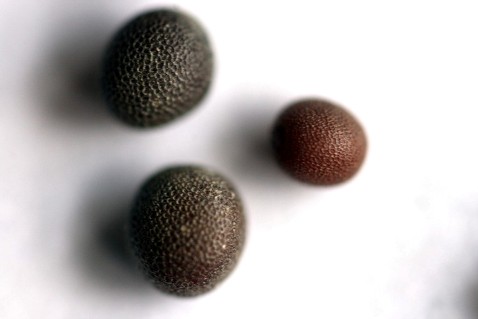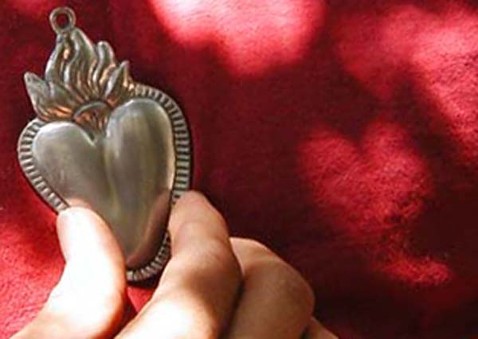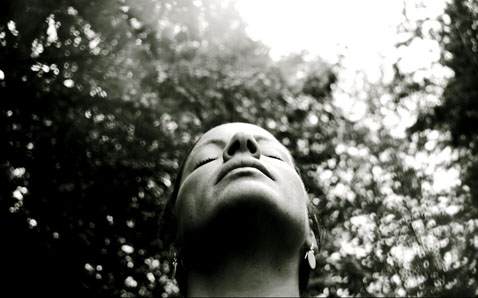I felt holy after she died.
What I mean to say is that I felt disemboweled, ripped open and gutted, my innards in a heap before me. I, Prometheus, chained to a rock, punished for stealing a daughter for nine months. Grief swept down as I was chained to the cliff, feasting on my liver, or perhaps more like my sanity and sense of justice, as I watched desperate. But still, in that torture, not because of it, I felt holy. Holier than before her death.
It was a short-lived holiness. Anger unchained me from the rock, and became my closest companion in the days that followed. The expletives that came from me were inhuman and ungodly--a hymn of the self-pitying. But for a moment, maybe a week or two, I felt holy, and I have been riding its coattails, cursing it, making sense of it, meditating on it and writing about it since it happened.
Lucia was stillborn. I found out she was dead. And two beats later, I found out I had to birth her. Dead. I wanted them to cut me open and pull her out. No, wait, I wanted them to knock me out, cut me open, then pull her out. I wanted them to do anything to prevent me from suffering more. I squirmed at the idea of having to push. I felt definitely entitled not to push. I wept for the injustice of having a dead daughter in me. I wept for me.
"Why us?" I shrieked. "What did we do?" We have this common wisdom, or maybe it is a kind of whisper down the alley between women, that giving birth is the hardest, most profound pain you can endure. And then the other thing, losing a child, is the most profound psychic pain you can endure. I don't know. Giving birth to a dead child and then living with the fact for the rest of your life is the longest suffering experience I could imagine. I felt like I would enter into a stasis of labor. I would hold onto the pain and suffering like it will connect me with the brief time I had with Lucia.
During the time between finding out she was dead and birthing her, I was hooked up to wires, and sitting in a bed with contractions trying to make some fucking sense of what was happening. I opened the grief package they gave me. Front and center, in the middle of the page, there was a poem. I began reading it, and I recognized the words.
Where do I know this poem? I have read this before.
I skipped to the bottom of the page. I recognized the name immediately. It was written by one of my colleagues' husbands. I live in the sixth most populated city in the United States. I was birthing in a hospital that gives birth to over five thousand babies a year. And yet the first other person I encountered after finding out Lucy died was someone I already knew. Tears were streaming down my face before I realized I was crying. And I wept for her loss all over again, and for her husband.
As the waves of contractions pulsated through me, I realized that I was not the first person to go through the pain of labor, nor was I the first person to go through the pain of losing your child. I am not even the first person to go through them both at the same time. I was wrapped up in my suffering, feeling this narcissism of grief settle into my old bones. "Why did this happen to ME? What did I do? Why did MY baby die?" Me. Me. Me. And here was this person who also lost her baby. A person I knew. The fact that I knew her humanized her. I remember seeing her grief and her sorrow. It oozed into us all in the office. I remember running into her in the bathroom at work and crying with her.
Did I tell her enough how sorry I was? Did I tell her then that reading the email about her loss made me cry for the first time in my career in front of my colleagues? Did I tell her that every Mother’s Day I thought of her baby? Did I even say anything to her? Was I the person to her that I needed now?
No.
I am deeply flawed. It was humbling. I felt so completely human, and like such a complete fucking asshole too. But I felt so part of human suffering and the human experience. A wealth of compassion washed over me. And I suddenly remembered this Buddhist folktale called Kisa Gotami and the Mustard Seed. It is also about a babylost mother. I read it in many forms throughout the years, but about two weeks before Lucia died, I read it out loud to my daughter for bedtime. Back then, I read folktales and Greek mythology aloud as she fell asleep. They were more for me than her. I didn’t cry for Kisa Gotami when I read it. I didn’t cry. I didn’t see myself in her.

photo by quinn.anya
Kisa Gotami's only son died one night as there was a thunderstorm raging. Kisa knew something was wrong, because the thunder would have woke him. She ran to his bed and he was dead. Throughout the night, she prayed to all the gods, and then to all the Devils, it is written, but not one brought her baby back to life. And so she went to every doctor, chemist, snakecharmer, and charlatan in town. Everyone pitied Kisa Gotami because she was a good woman and she was losing her mind. Some told her that the boy was dead, others went along with the delusion that there was help. She finally made her way to the apothecary across the market. People told him she was headed his way, and so he was ready for her. He regretted that he didn't have a cure for her, but the Buddha, he said, who was once a physician, did. She ran to the temple and interrupted meditation. The monks grew impatient with her, as she was carrying her rotting dead son, covered with maggots, asking him to be cured. But the Buddha sat and considered her plea. He told her that he did have the cure she sought. And he said it was quite simple. She should leave her son with him, then she just needed to bring him one thing--a mustard seed. Not any mustard seed, though, it needed to be a mustard seed from a family who has not experienced death. As Kisa Gotami went door to door, each person said, "Of course, I have a mustard seed, but my father died this year." Or my wife, or my uncle, or my sister or even my son. When she returned to the Buddha, who had cremated her son in her absence, she came back humbled and enlightened. Death and suffering escapes no person. She became one of the Buddha's monks.
In my lowest moment, the poem, and moments later, that Buddhist story, took me out of my own suffering to feel compassion for another person's loss. When I left the hospital, I grieved for Lucia, but I also grieved for and with everyone in the world. I saw people as the embodiment of their suffering. Funeral homes on every corner felt illuminated, suddenly, with a kind of healing light. Every person grieved, like we grieved. When someone would offer condolences in the first weeks, I would immediately tear up and say, “No, no, I’m sorry.” Sam grew livid at that habit, as though I were apologizing for our baby dying, or apologizing for receiving condolences, but it wasn’t that. Even the anxiety and fear people had to approach me, I felt compassion for that. They were suffering. I could hear it in their voices. I could smell it emanating from their bodies. Some of those people felt genuine grief at my daughter’s death, and some had felt genuine fear at having to talk to me. I was sorry for them.
It is an incredibly healing way to imagine the world—compassionate, empathetic, vulnerable—but it was so disparate with what I had just experienced. I often thought about my sanity, and if I was sane or not. I thought of Kisa Gotami not being able to see the maggots, but only see her beautiful newborn son. I recognized that if I wanted to remain sane, I had to accept this world for what it is, not what I wanted it to be. People die. People we love die regardless of their goodness. Humans are fragile beings. In the holy days, I understood this. I accepted it. I felt this amazing sense of connection with the universe and all sentient beings because of it. This calm emanated from me, and around me for two weeks. I sobbed often, yes, but for all of our suffering. Sometimes thinking about my husband’s suffering made me cry more than my own suffering. It was one of the most spiritually profound periods of my life.
And then it I felt it slip away from my body, the same way my daughter slipped from my body, growing colder and more distant. I am actually embarrassed to write this, because I lost this connectedness with everything and everyone. I squandered wisdom. Holiness was replaced with anger, bitterness and resentment. Rather than feel connectedness, I felt only alienation. I remember my Buddhist therapist saying to me, "So, you lost your daughter and then you lost your enlightenment?"
I hadn’t thought to call it enlightenment, but I suddenly grieved for my enlightenment. So many losses, I mused. I can't endure another. I felt enlightenment's absence more after I realized its preciousness. Then I doubted it I ever touched that place. Maybe holiness, I reasoned, was really the numb of early grief. Later I realized that wisdom, like Lucy, never belonged to me.
I sit cross-legged now, tap the gong and settle into my bones. I once touched a sense of everything by having nothing. It is the koan I meditate on now. When I had nothing, I held everything. The anger falls off me again in that moment. I can only ever borrow enlightenment and wisdom, because I will always wrestle with my human flaws. It is a true lesson in wretchedness.
Did your loss help you feel connected or alienated to other people? Did it connect you with a universal sense of suffering? How did you see your suffering in relation to other suffering? Did you gain any wisdom in your grief? If so, what wisdom? Or does the whole idea of wisdom and gain make you uncomfortable?






